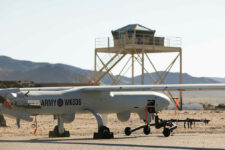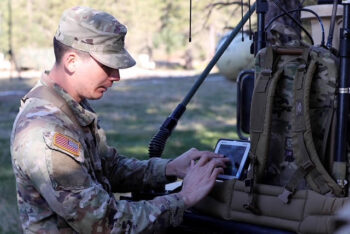
Israeli soldiers prepare thier artillery unit near the border with Gaza Strip on May 14, 2021 in Sderot, Israel. (Amir Levy/Getty Images)
TEL AVIV — With signs that an agreement is close between Iran, Europe and the United States on restarting the nuclear agreement, Israel is predictably upset — and predictably indicating that military action against Tehran is on the table as a response.
Although leaders in Israel had been careful not to publicly criticize the Biden administration for its efforts to bring back the Joint Comprehensive Plan of Action (JCPOA) after the Trump administration withdrew from it, there have been plenty of signs over the last year that Jerusalem is opposed to the return of the agreement.
Israel has also made it clear it does not feel it will be bound by any agreement made between Brussels, Washington and Tehran. Behind the scenes, Israel has repeatedly delivered information to Washington showing what it describes as bad faith actions from Iran that, Jerusalem feels, should disqualify Iran from receiving the benefits it would get in any JCPOA return.
Details of a proposed JCPOA framework were leaked last week by the Iran International website, operated from London by opponents of the Iranian regime. The leaked report, Iran International says, includes on alleged remarks by Iran’s chief nuclear negotiator Ali Bagheri-Kani on “concessions” Iran claims to have received from the US. However, the details do not mentions what Iran has agreed to do to return to compliance with the JCPOA.
As part of what feels like a last-ditch effort to stop the discussions, Israeli National Security Adviser Eyal Hulata is in Washington this week, to attempt to meet with American defense officials to share with them more details of what Israel calls “the Iranian nuclear scam.” (A meeting between Hulata and Secretary of State Antony Blinken was reportedly cancelled due to scheduling at the last minute.)
RELATED: Iran fears push Israel, Arab nations to once-‘unthinkable’ security partnerships
That description sums up how the defense an intelligence community here feels about the push by the Biden admin for a JCPOA 2.0 — especially the sense that the White House has ignored the information presented by Israel because it is dead set on rolling back the Trump decision to kill the Iran agreement.
“We have proved again and again by hard intelligence evidence that Teheran is lying continuously, and does not intend to fulfill everything it will promises to do in the framework of a new agreement” a senior Israeli defense source told Breaking Defense.
Proponents of the JCPOA argue that the deal was working to slow Iran’s “breakout time” — the time Iran would need to create fissile material for a nuclear weapon — before it was scrapped by the Trump administration; getting Iran back under a deal would, they argue, be in everyone’s best interests. But in Israel there is a strong belief Iran will take the sanctions relief as part of JCPOA but continue to work its nuclear program in secret, despite pledges to stop doing so.
Dani Yatom, the former head of the Israeli Mossad, told Breaking Defense that with a JCPOA redux feeling predestined, now is the time to hold low-profile discussions with the Americans in order to avoid the creation of loopholes for Iran to exploit.
“My assessment is that if a new nuclear agreement is signed the Iranians will take advantage of every opportunity to breach it, as they did when the old agreement was valid,” said Yatom.
Similarly, Amos Yadlin, the former head of the Israeli Defense Forces intelligence directorate, told Breaking Defense that Israel has to make a final, big push to impact the wording on the new agreement before anything is signed.
Primarily, he said, “Israel must demand that Washington fulfills the commitments of the three last presidents — that Iran will not have a nuclear bomb.” (President Joe Biden has previously stated he would be willing to use force to keep Iran from getting a nuclear weapon.)
Possible Actions To Come
The question becomes how the creation of a new JCPOA would impact Israel’s operations. After all, Jerusalem has already been involved in both deniable espionage activities against Iranian interest, as well as more public strikes against Iranian convoys of weapons in Syria.
Israel has plans of how to act at any stage of the Iranian nuclear program. Officially, of course, no one is detailing the plans, but based on past actions allegedly performed by Israel, the ongoing so-called “shadow war” will go to a higher level should the JCPOA begin again.
A direct attack on Iranian nuclear sites will likely remain a last resort, but experts and sources agree Israel may step up “pinpoint” actions that have allegedly been performed in recent years. These may include hits against additional nuclear and ballistic missiles scientists, and enhancing the cyber war against all the sites related to the program.
RELATED: With missile attack and alleged espionage, Israel-Iran ‘shadow war’ slips into the open
Notably, in recent months the military here has been doing joint exercises to work out combat scenarios that, according to sources, line up with what could play out should Iran gain a nuclear weapon. These exercises involved all types of units generally referred as part of the IDF’s “Depth Command,” stood up in 2011 in order to plan out long distance attacks from Israeli territory. Israel is aware that the main Iranian nuclear sites are underground, and according to sources this fact has been taken into account when the combat scenarios have been exercised.
An IDF spokesperson only said that Israel is getting ready for “different” types of war with these exercises.
Another option may be increased strikes against Iranian proxies in the region. Last week the Israeli chief of staff, Lt. Gen. Aviv Kochavi revealed that during the recent “Breaking Dawn” clash with the Islamic Jihad in Gaza, Israel performed an attack in what he called a “third country.” Sources here pointed to a report in a number of media outlets that a blast in a camp in Sanaa, the Yemeni capital, on Aug. 7 had resulted in the death of at least six Iranian and Lebanese operatives.
Situated on the southern end of the Arabian Peninsula, Yemen has been a safe haven for Iranian-backed Houthi militias to attack targets in Saudi Arabia and the Red Sea.
Complicating any potential action: The potential return of the JCPOA comes at a politically difficult time in Israel, with a Nov. 1 election set to select Israel’s next prime minister — the fifth such contest in just three years.
Current Prime Minister Yair Lapid and defense minister Benny Gintz, both candidates to be the next prime minister whom are generally happy to talk on record whenever they see a microphone, are being careful in their comments; spokespeople for both men declined to comment when asked by Breaking Defense if they were disappointed by Washington’s lack of reaction to intelligence put forth by Israel in recent months showing an Iranian threat.
Top defense insights from 2024
A curated look at standout opinions and analysis covering topics like uncrewed systems, NATO partnerships, US-Saudi defense dynamics, and evolving warfare strategies, spotlighting key issues shaping the global defense landscape.


























